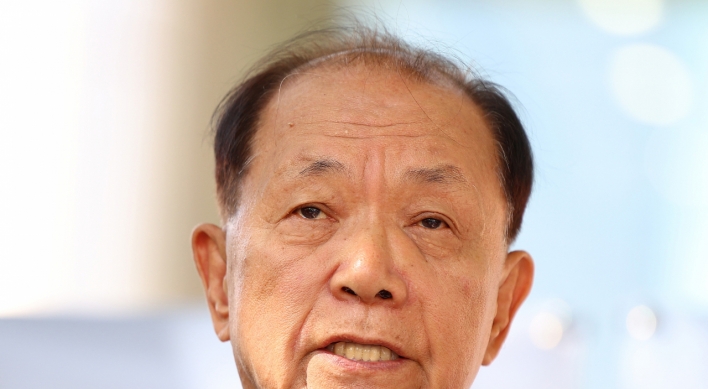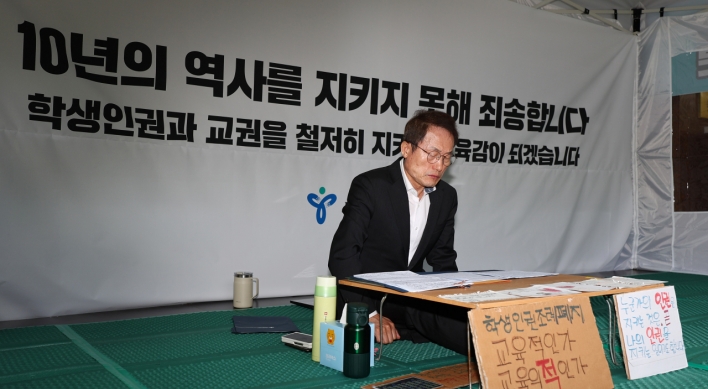Heavy drinking has long been considered a major risk factor for dementia, but a new local study has found that almost 90 percent of South Korea’s elderly patients with the disease do not have a history of heavy drinking.
The study, compiled by Konkuk University Medical Center’s department of neurology, conducted research on 554 patients with severe dementia and aged 65 or older.
Among them, 81.9 percent were women, while 89.9 percent were nondrinkers. Only 9.1 percent were either drinking heavily or had done so in the past.
The researchers noted that part of the reason could be that the proportion of Korean female heavy drinkers in general is significantly smaller than male heavy drinkers.
Last year for instance, only 6 percent of all Korean women aged 20 or older said they were drinking heavily -- defined as drinking more than five glasses of alcohol weekly. On the other hand, 20.7 percent of all Korean men said they were heavy drinkers.
The study, compiled by Konkuk University Medical Center’s department of neurology, conducted research on 554 patients with severe dementia and aged 65 or older.
Among them, 81.9 percent were women, while 89.9 percent were nondrinkers. Only 9.1 percent were either drinking heavily or had done so in the past.
The researchers noted that part of the reason could be that the proportion of Korean female heavy drinkers in general is significantly smaller than male heavy drinkers.
Last year for instance, only 6 percent of all Korean women aged 20 or older said they were drinking heavily -- defined as drinking more than five glasses of alcohol weekly. On the other hand, 20.7 percent of all Korean men said they were heavy drinkers.

The study also found that elderly heavy drinkers tend to detect their dementia symptoms early.
The researchers said this could be due to how for elderly Koreans, being a drinker often indicates the person is socially active, as most social gatherings in Korea often involve alcohol.
“Drinking is an indicator of social interaction (in South Korea),” researchers wrote in the study. “As activities of drinking can include certain cognitive tasks and social interactions, patients who never drank may have a delay in medical attention until the disease becomes much more serious.”
In 2014, the Health Ministry has announced that a heavy drinker is 7.42 times more likely to develop dementia than a person who does not drink.
The ministry has been discouraging the public from drinking, in its effort to decrease the number of future dementia patients, by banning alcohol sales and drinking at university campuses.
The study by Konkuk University, however, suggested that nondrinkers in Korea may be more vulnerable to the particular disease not because they do not consume alcohol, but because they are more likely to be socially isolated.
Its research findings showed that a large portion of the surveyed patients had other tendencies of “social outsiders.”
The study did not delve into the medical correlation between alcohol consumption and dementia.
For example, 91.9 percent of them were physically inactive, and 67.1 percent were either not religious or not engaged in any physical religious activities, such as going to church on weekends.
A government report last year also showed that 80 percent of elderly Koreans are known to spend their leisure time solely watching TV at home.
“Factors that are associated with being a social outsider, such as nondrinking, physical inactivity and religious inactivity were the barriers to timely access to health care services,” the researchers wrote in the study.
“For one, participating in religious activities requires social interaction and strategies that involve executive functioning -- such as problem solving, reasoning and attentional control. Those who are not involved in such social activities have a lower chance of realizing their symptoms as being alone and inactive does not involve such functioning.”
While social isolation was found to be a major cause of late detection of the disease, the study found another paradoxical point: elderly individuals who live alone had a much lower risk of late detection of dementia than those who live with their family members.
“Elderly patients who live alone are required to perform all of their daily activities and chores on their own. This makes it easier for them to detect dementia symptoms early as even a subtle cognitive decline could make their lives difficult when they have no one to rely on,” the researchers wrote in the study.
“However, those who live with their family members are often dependent on their family members, even for very simple and basic chores. This also has to do with Korea’s tradition of respecting the elderly and adult children being obligated to do all the chores for them when their parents become old. This can also lead to physical inactivity which can cause late detection of the disease.”
By Claire Lee(dyc@heraldcorp.com)
The researchers said this could be due to how for elderly Koreans, being a drinker often indicates the person is socially active, as most social gatherings in Korea often involve alcohol.
“Drinking is an indicator of social interaction (in South Korea),” researchers wrote in the study. “As activities of drinking can include certain cognitive tasks and social interactions, patients who never drank may have a delay in medical attention until the disease becomes much more serious.”
In 2014, the Health Ministry has announced that a heavy drinker is 7.42 times more likely to develop dementia than a person who does not drink.
The ministry has been discouraging the public from drinking, in its effort to decrease the number of future dementia patients, by banning alcohol sales and drinking at university campuses.
The study by Konkuk University, however, suggested that nondrinkers in Korea may be more vulnerable to the particular disease not because they do not consume alcohol, but because they are more likely to be socially isolated.
Its research findings showed that a large portion of the surveyed patients had other tendencies of “social outsiders.”
The study did not delve into the medical correlation between alcohol consumption and dementia.
For example, 91.9 percent of them were physically inactive, and 67.1 percent were either not religious or not engaged in any physical religious activities, such as going to church on weekends.
A government report last year also showed that 80 percent of elderly Koreans are known to spend their leisure time solely watching TV at home.
“Factors that are associated with being a social outsider, such as nondrinking, physical inactivity and religious inactivity were the barriers to timely access to health care services,” the researchers wrote in the study.
“For one, participating in religious activities requires social interaction and strategies that involve executive functioning -- such as problem solving, reasoning and attentional control. Those who are not involved in such social activities have a lower chance of realizing their symptoms as being alone and inactive does not involve such functioning.”
While social isolation was found to be a major cause of late detection of the disease, the study found another paradoxical point: elderly individuals who live alone had a much lower risk of late detection of dementia than those who live with their family members.
“Elderly patients who live alone are required to perform all of their daily activities and chores on their own. This makes it easier for them to detect dementia symptoms early as even a subtle cognitive decline could make their lives difficult when they have no one to rely on,” the researchers wrote in the study.
“However, those who live with their family members are often dependent on their family members, even for very simple and basic chores. This also has to do with Korea’s tradition of respecting the elderly and adult children being obligated to do all the chores for them when their parents become old. This can also lead to physical inactivity which can cause late detection of the disease.”
By Claire Lee(dyc@heraldcorp.com)




![[KH Explains] No more 'Michael' at Kakao Games](http://res.heraldm.com/phpwas/restmb_idxmake.php?idx=644&simg=/content/image/2024/04/28/20240428050183_0.jpg&u=20240428180321)













![[Herald Interview] Mistakes turn into blessings in street performance, director says](http://res.heraldm.com/phpwas/restmb_idxmake.php?idx=652&simg=/content/image/2024/04/28/20240428050150_0.jpg&u=20240428174656)
